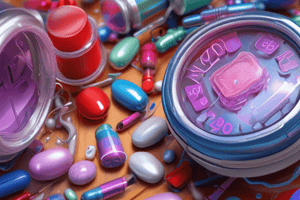Podcast
Questions and Answers
What is a significant risk associated with combining TCAs and MAOIs?
What is a significant risk associated with combining TCAs and MAOIs?
- Serotonin syndrome (correct)
- Severe hypotension
- Drowsiness
- Increased nausea
Which side effect is often linked with the use of MAOIs?
Which side effect is often linked with the use of MAOIs?
- Hypertensive crisis (correct)
- Increased energy levels
- Lowered blood pressure
- Decreased appetite
How can TCAs affect patients who smoke tobacco?
How can TCAs affect patients who smoke tobacco?
- Decreased effectiveness of TCAs (correct)
- Suppress appetite
- Enhance blood pressure control
- Increase effectiveness of TCAs
What is a primary reason for using tricyclic antidepressants (TCAs) in treatment?
What is a primary reason for using tricyclic antidepressants (TCAs) in treatment?
Which condition should preclude the use of tricyclic antidepressants?
Which condition should preclude the use of tricyclic antidepressants?
Which of the following could potentially occur if TCAs are combined with an MAOI?
Which of the following could potentially occur if TCAs are combined with an MAOI?
Which of the following dietary restrictions is essential for a patient on MAOIs?
Which of the following dietary restrictions is essential for a patient on MAOIs?
What symptom should patients taking MAOIs be cautious of that may indicate an adverse effect?
What symptom should patients taking MAOIs be cautious of that may indicate an adverse effect?
Why are mood stabilizers primarily prescribed for patients with bipolar illness?
Why are mood stabilizers primarily prescribed for patients with bipolar illness?
What is the primary use of lithium in medical treatment?
What is the primary use of lithium in medical treatment?
What is a common symptom associated with elevated lithium levels?
What is a common symptom associated with elevated lithium levels?
What is a critical factor in ensuring the safety of lithium therapy?
What is a critical factor in ensuring the safety of lithium therapy?
Which of the following is an expected side effect of lithium therapy?
Which of the following is an expected side effect of lithium therapy?
What is the therapeutic range for lithium levels initially?
What is the therapeutic range for lithium levels initially?
What should patients be educated to avoid in relation to lithium therapy?
What should patients be educated to avoid in relation to lithium therapy?
Which of the following is a sign of severe lithium toxicity?
Which of the following is a sign of severe lithium toxicity?
What distinguishes acute psychosis from chronic psychosis?
What distinguishes acute psychosis from chronic psychosis?
Why is it important to distinguish between delirium and chronic psychosis?
Why is it important to distinguish between delirium and chronic psychosis?
Which laboratory tests are important prior to starting lithium therapy?
Which laboratory tests are important prior to starting lithium therapy?
What is the desired serum lithium level for treating acute mania?
What is the desired serum lithium level for treating acute mania?
What symptom indicates the need for immediate contact with a healthcare provider in a patient taking lithium?
What symptom indicates the need for immediate contact with a healthcare provider in a patient taking lithium?
Why should older adults start with lower doses of lithium?
Why should older adults start with lower doses of lithium?
Which of the following is a common adverse reaction to lithium?
Which of the following is a common adverse reaction to lithium?
How often should serum lithium levels be monitored after stabilization of the dosage?
How often should serum lithium levels be monitored after stabilization of the dosage?
Flashcards
Tricyclic Antidepressants (TCAs)
Tricyclic Antidepressants (TCAs)
Older class of antidepressants, thought to interfere with norepinephrine and serotonin reuptake.
TCA Side Effects
TCA Side Effects
Common side effects include dry mouth, drowsiness, constipation, nausea, orthostatic hypotension, potential weight changes, and vision problems.
TCA Adverse Reactions
TCA Adverse Reactions
Serious side effects can include cardiac problems like dysrhythmias and heart failure, seizures, and potential for mania in bipolar individuals, or delirium in older patients.
TCA Use in Specific Conditions
TCA Use in Specific Conditions
Signup and view all the flashcards
TCA Drug Interactions
TCA Drug Interactions
Signup and view all the flashcards
TCA-MAOI Interaction
TCA-MAOI Interaction
Signup and view all the flashcards
TCA and Other Substances
TCA and Other Substances
Signup and view all the flashcards
MAOIs
MAOIs
Signup and view all the flashcards
Tyramine-rich foods
Tyramine-rich foods
Signup and view all the flashcards
Hypertensive Crisis
Hypertensive Crisis
Signup and view all the flashcards
Dietary Restrictions (MAOIs)
Dietary Restrictions (MAOIs)
Signup and view all the flashcards
MAOI discontinuation period
MAOI discontinuation period
Signup and view all the flashcards
Bipolar Disorder
Bipolar Disorder
Signup and view all the flashcards
Mood Stabilizers
Mood Stabilizers
Signup and view all the flashcards
Lithium
Lithium
Signup and view all the flashcards
Anticonvulsants
Anticonvulsants
Signup and view all the flashcards
Patient Teaching (MAOIs)
Patient Teaching (MAOIs)
Signup and view all the flashcards
TCAs side effects
TCAs side effects
Signup and view all the flashcards
Serotonin syndrome
Serotonin syndrome
Signup and view all the flashcards
TCA-Marijuana interaction
TCA-Marijuana interaction
Signup and view all the flashcards
TCA-tobacco interaction
TCA-tobacco interaction
Signup and view all the flashcards
TCA assessment
TCA assessment
Signup and view all the flashcards
TCA monitoring
TCA monitoring
Signup and view all the flashcards
MAOI mechanism
MAOI mechanism
Signup and view all the flashcards
MAOI hypertensive crisis
MAOI hypertensive crisis
Signup and view all the flashcards
MAOI-Tyramine interaction
MAOI-Tyramine interaction
Signup and view all the flashcards
MAOI-SSRI interaction
MAOI-SSRI interaction
Signup and view all the flashcards
Drug Interactions with MAOIs
Drug Interactions with MAOIs
Signup and view all the flashcards
MAOI Adverse Effects
MAOI Adverse Effects
Signup and view all the flashcards
TCA abrupt discontinuation
TCA abrupt discontinuation
Signup and view all the flashcards
Sun Sensitivity with TCAs
Sun Sensitivity with TCAs
Signup and view all the flashcards
Lithium Use
Lithium Use
Signup and view all the flashcards
Lithium Narrow Therapeutic Range
Lithium Narrow Therapeutic Range
Signup and view all the flashcards
Lithium Toxicity Symptoms
Lithium Toxicity Symptoms
Signup and view all the flashcards
Lithium Blood Level Monitoring
Lithium Blood Level Monitoring
Signup and view all the flashcards
Lithium Side Effects
Lithium Side Effects
Signup and view all the flashcards
Mania Symptoms
Mania Symptoms
Signup and view all the flashcards
Mood Stabilizer Use
Mood Stabilizer Use
Signup and view all the flashcards
Lithium Dosage
Lithium Dosage
Signup and view all the flashcards
Lithium Monitoring Risk Factors
Lithium Monitoring Risk Factors
Signup and view all the flashcards
Lithium Toxicity Risk
Lithium Toxicity Risk
Signup and view all the flashcards
Lithium Toxicity Symptoms
Lithium Toxicity Symptoms
Signup and view all the flashcards
Lithium Therapeutic Range
Lithium Therapeutic Range
Signup and view all the flashcards
Monitoring Lithium Levels
Monitoring Lithium Levels
Signup and view all the flashcards
Lithium and Fluid Intake
Lithium and Fluid Intake
Signup and view all the flashcards
Lithium and Salt Intake
Lithium and Salt Intake
Signup and view all the flashcards
Drug Interactions (Lithium)
Drug Interactions (Lithium)
Signup and view all the flashcards
Lithium and Pregnancy
Lithium and Pregnancy
Signup and view all the flashcards
Lithium and Older Adults
Lithium and Older Adults
Signup and view all the flashcards
Lithium Initial Monitoring
Lithium Initial Monitoring
Signup and view all the flashcards
Lithium Toxicity Levels
Lithium Toxicity Levels
Signup and view all the flashcards
Lithium and Mental Status
Lithium and Mental Status
Signup and view all the flashcards
Acute Psychosis
Acute Psychosis
Signup and view all the flashcards
Chronic Psychosis
Chronic Psychosis
Signup and view all the flashcards
Delirium
Delirium
Signup and view all the flashcards
Positive Symptoms (Psychosis)
Positive Symptoms (Psychosis)
Signup and view all the flashcards
Negative Symptoms (Psychosis)
Negative Symptoms (Psychosis)
Signup and view all the flashcards
Hallucinations
Hallucinations
Signup and view all the flashcards
Delusions
Delusions
Signup and view all the flashcards
Typical Antipsychotics
Typical Antipsychotics
Signup and view all the flashcards
Extrapyramidal Symptoms (EPS)
Extrapyramidal Symptoms (EPS)
Signup and view all the flashcards
Pseudoparkinsonism
Pseudoparkinsonism
Signup and view all the flashcards
Study Notes
Tricyclic Antidepressants (TCAs)
- Older class of drugs used since the 1950s for depression.
- Mechanism of action unknown, but thought to interfere with norepinephrine and serotonin reuptake.
- Effective for mild to moderate depression, but more side effects than SSRIs or SNRIs.
- Primarily used in severe depression or unresponsive cases.
- Also used for migraine headaches, panic disorder, OCD, and peripheral neuropathy.
Side Effects and Adverse Reactions (TCAs)
- Common side effects: dry mouth, drowsiness, constipation, nausea, orthostatic hypotension.
- Weight gain or loss possible.
- Potential for mild to severe vision problems. Notify healthcare provider.
- Severe adverse reactions: cardiac dysrhythmias, heart failure, seizures, mania triggers in bipolar patients, delirium in older patients with cognitive impairment.
- Increased suicide risk in younger patients.
- Contraindicated in patients with glaucoma.
Drug Interactions (TCAs)
- Avoid with CNS depressants (opioids, sedatives, alcohol). These increase risk of respiratory depression, sedation, and hypotension.
- Interactions with antidysrhythmics can cause serious cardiac issues.
- Avoid with MAOIs, SSRIs, and SNRIs to prevent serotonin syndrome.
- St. John's wort (herbal) and marijuana are also dangerous to combine with TCAs.
- Tobacco reduces TCA effectiveness.
Nursing Implications and Patient Teaching (TCAs)
- Assess patient history, current drug use, and mental status, including suicide risk.
- Monitor vital signs and baseline weight.
- Note drug abuse history.
- Reassess symptoms to evaluate drug response (can take weeks).
- Educate patients on side effects (dry mouth, constipation, orthostatic hypotension), increased blood pressure reports.
- Taper TCAs when switching drugs to reduce withdrawal symptoms.
- Patient and family teaching: do not stop abruptly; avoid alcohol, sedatives, opioids; sugarless items for dry mouth; sun protection; slow position changes; bedtime dosing; report new/troublesome symptoms; wear medical alert bracelet.
Monoamine Oxidase Inhibitors (MAOIs)
- Block monoamine oxidase enzymes, increasing neurotransmitters (dopamine, norepinephrine, serotonin).
- Used as a last resort for severe depression that doesn't respond to other treatments.
- High-Risk Interaction: Hypertensive crisis triggered by foods containing tyramine (aged cheese, cured meats, wine, beer).
Side Effects and Adverse Reactions (MAOIs)
- Common side effects: constipation, headache, dizziness, drowsiness, dry mouth, orthostatic hypotension.
- Weight gain (in some).
- Severe adverse reactions: liver damage, blood disorders, suicidal thoughts, severe hyponatremia.
- Serotonin Syndrome Risk: Do not combine MAOIs with SSRIs within 2 weeks.
Drug Interactions (MAOIs)
- Hypertensive Crisis Risk: Avoid MAOIs with SSRIs, SNRIs, St. John's Wort, stimulants, drugs that lower blood pressure, CNS depressants (opioids, alcohol, benzodiazepines).
- Risk of hypoglycemia in patients taking insulin or oral hypoglycemics.
- Hypertensive crisis from high-tyramine foods.
- Caffeine and tyramine-rich foods should be avoided for 2 weeks after stopping MAOI.
Nursing Implications and Patient Teaching (MAOIs)
- Obtain detailed drug and diet history, including herbal drugs (St. John's wort).
- Monitor vital signs, weight, labs, and suicidal thoughts.
- Educate on dietary restrictions (avoid high-tyramine foods, caffeine, and alcohol).
- Educate on side effects (dry mouth). Monitor for hypotension.
- Teach about importance of monitoring blood sugar closely for patients on insulin or other antidiabetic drugs.
- Educate patients: take as prescribed, avoid alcohol and CNS depressants, avoid caffeine and high-tyramine food; slowly change positions; avoid driving, operating machinery; report symptoms (fever, severe headache, nausea, chest pain) immediately; wear medical ID
Mood Stabilizers (e.g., Lithium, Anticonvulsants)
- Primarily for bipolar disorder to manage mania and depression.
- Long-term treatment is common.
Lithium - Action and Uses
- Used primarily for bipolar illness (acute mania, maintenance).
- Thought to inhibit neurotransmitter synthesis, storage, release, and reuptake.
- Non-sedative effects.
- Onset of action is roughly 1 week, full benefit in 2-3 weeks.
Lithium - Therapeutic Range
- Very narrow therapeutic range.
- Careful monitoring of lithium blood levels (initial level ~3 days into therapy).
- Regular serum measurements are essential to avoid toxicity.
- Therapeutic level 0.8-1.2 mEq/L initially, then 0.8-1mEq/L for maintenance.
- Toxicity risks: older age, kidney disease, low sodium levels, dehydration, heart disease, or taking certain drugs (ACE inhibitors, diuretics, NSAIDs).
Lithium - Side Effects and Adverse Reactions
- Mild weight gain, thirst, urine output increase, dry skin, mild drowsiness.
- Hand tremors (often decrease with continued use).
- Initial nausea, vomiting, or diarrhea.
- Toxicity symptoms worsen with elevated lithium levels.
Lithium - Drug Interactions
- Interactions with diuretics, NSAIDs, antidepressants, and antipsychotics.
Nursing Implications and Patient Teaching (Lithium)
- Baseline labs (CBC, BUN/creatinine, electrolytes, thyroid function).
- Assess mental status (acute symptoms, hyperactivity, irritability), dietary history and sodium, fluid intake.
- Monitor for signs of toxicity (nausea, vomiting, drowsiness, tremors, incoordination).
- Report symptoms needing immediate intervention by RN or physician.
- Frequent lithium level monitoring. Desired level for acute mania is 0.8-1.2 mEq/L, while maintenance level is ~0.8 -1 mEq/L. Levels over 1.5 are toxic.
- Teach about avoiding significant changes in salt/fluid intake; reporting thirst / urination changes; avoiding alcohol/sedatives; seeking help for suicidal thoughts; wearing a medical alert bracelet/card; frequent blood level checks.
Antipsychotics (Typical & Atypical)
- Treat psychosis (loss of reality contact) in schizophrenia and other conditions.
- Atypical antipsychotics often better for long-term use due to lower risk of EPS.
- Typical antipsychotics primarily treat positive symptoms (hallucinations, delusions)
Typical Antipsychotics
- Block dopamine receptors, impacting positive symptoms.
- Cause extrapyramidal side effects (EPSs) - movement disorders.
- Includes phenothiazines and nonphenothiazines.
- Potential for neuroleptic malignant syndrome (NMS): High fever, confusion, blood pressure changes, severe EPSs
Atypical Antipsychotics
- Work via various mechanisms, often blocking both dopamine and serotonin receptors.
- Reduced risk of EPSs compared to typical.
- Often used alone for long-term.
- Risk of weight gain, hypertriglyceridemia, insulin resistance, and diabetes.
- Increased risk of cardiac dysrhythmias (prolonged QT interval), more frequent in clozapine (agranulocytosis - lower white blood cells)
- Drug interactions with other psych meds and alcohol.
Nursing Implications and Patient Teaching (Antipsychotics)
- Assess level of consciousness, agitation, hallucinations, and delusions (mental status exam, if applicable).
- Monitor vital signs closely (especially temperature).
- Recognize and report EPSs.
- Monitor for NMS (high fever, confusion, blood pressure change, EPSs).
- Closely monitor vital signs in patients with other health issues.
- Teach patients about side effects, medication adherence, avoiding alcohol/sedatives, and reporting symptoms.
- Encourage good oral hygiene.
- Teach about temperature changes ( avoid extremes, recognize dehydration as a concern).
Studying That Suits You
Use AI to generate personalized quizzes and flashcards to suit your learning preferences.




